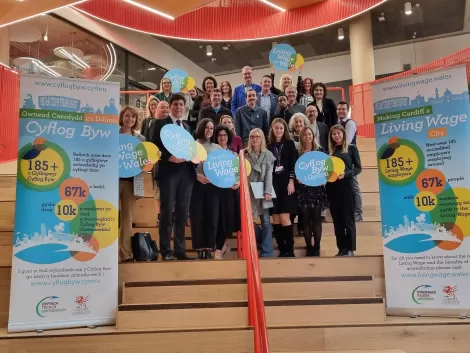The launch of the Living Wage Places Network - 2023
This year the Living Wage Foundation launched a Living Wage Places Network, where Living Wage Place Action Groups from across the UK come together to share their knowledge and experience and learn from each other.
The Living Wage Foundation’s Living Wage Places scheme recognises and celebrates areas that are going the extra mile by encouraging local employers to become Living Wage accredited and make the Living Wage the norm in their places. The real Living Wage is the only UK wage rate based on the actual cost of living, it’s currently £10.90 an hour, and £11.95 in London.
Living Wage Places Action Groups are made up of partnerships between public, private, and third-sector Living Wage employers and civil society members who work together on 3-year action plans. There are now 16 recognised Living Wage Places across the UK, from the Royal Docks in Newham in East London to the Greater Manchester City region.
Last year four of the most established Living Wage Place Action Groups – Dundee, Salford, Cardiff and Bristol - renewed their commitment for another three years. At the Living Wage Places network launch in January, representatives from these groups shared why advocating for the Living Wage is vital for their areas and how to encourage more accreditations.
Lessons learned from Cardiff, Bristol and Salford’s Action Groups
Chris Dabbs, Chief Executive of Unlimited Potential, from the Salford Living Wage City Action Group talked about their determination to make the real Living Wage standard for all employers in the area. Salford has the fastest growing economy and population in the Northwest of England, but Chris added that this rapid growth has led to a divide with half of the population doing well and the other half struggling just to get by.
The Salford Action Group’s aims include raising awareness amongst local people, particularly young people, and working to better understand the geographical spread of low pay and its impact on diverse communities. He outlined their plans to target notable employers in the private sector by emphasising the business benefits of the real Living Wage. The group is also looking to develop working relationships with funders and commissioners to include the real Living Wage as a requirement.

Cardiff Action Group - John Paxton (Cardiff Council), Nirushan Sudarsan and Fiona Meldrum from Citizens Cyrmu shared that part of the success of Cardiff as a Living Wage City is down to the strong partnership they’ve forged with a diverse range of organisations. Around 67,000 people now work for an accredited Living Wage employer in Cardiff which has put an extra additional £50m into the local economy. The group acknowledged that having the leader of Cardiff Council as an advocate has also been key as well as developing a sponsorship scheme where the Council pay the accreditation fee for SMEs. All Universities in Wales are now accredited as Living Wage employers which is partly thanks to working closely with Cardiff University and academics at their Business School. By providing support and advice throughout the accreditation progress and taking a “carrot rather than stick” approach, they’ve helped to encourage many more employers to sign up to pay the Living Wage. Working with Citizens Wales has also been the catalyst for a lot of Living Wage related work happening in Wales as they lead on community campaigning on lots of different issues, including the Living Wage.
Claire Herbert-Golden from Bristol City Council and the Bristol Living Wage City Action Group shared her vision of having a Bristol economy that is fair and inclusive. With a diverse city in terms of income they have done research to look at the scale of low pay and found that almost 1 in 5 jobs are in low paid sectors such as retail, wholesale, hospitality and catering; with 17% of workers in the area working in health and social care which is notoriously poorly paid.
The Action Group found that it’s important to talk to employers about why the real Living Wage matters to them and focus on the benefits it can bring in terms of retaining staff and reducing staff costs due to reduced turnover, as well as in terms of their environmental and social governance, and corporate social responsibility and social value policies.
The Living Wage Places scheme is a growing place-based movement designed to tackle in-work poverty in cities and boroughs across the UK through collaboration and action.
The next Living Wage Places Network event will be an in-person conference on 25th May to which all members of recognised and emerging Living Wage Place Action Groups are invited: https://www.eventbrite.co.uk/e/living-wage-places-network-event-tickets-602560894857
